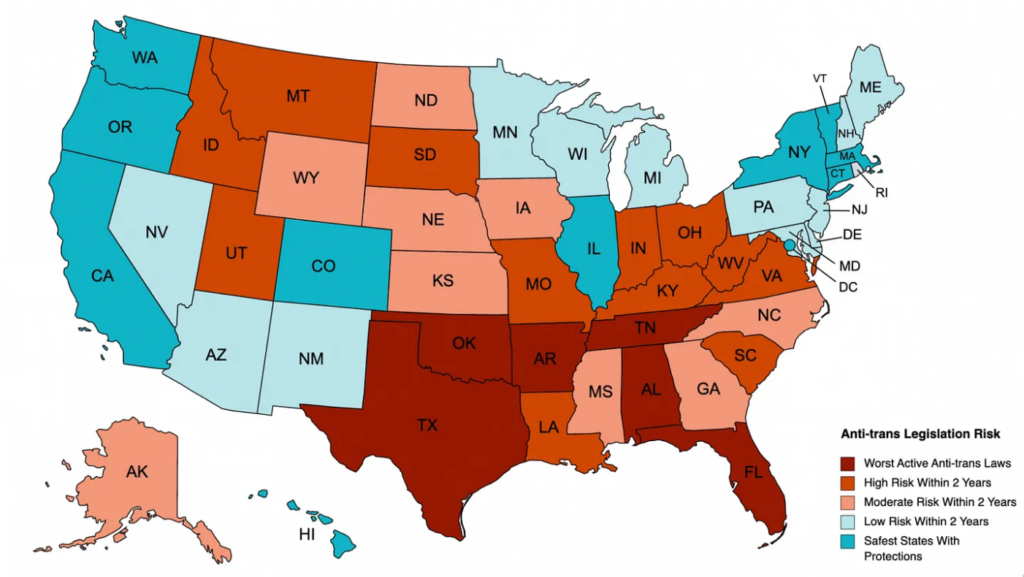To protect trans youth and the clinicians who support them, it is important that you as an SLP advocate at the state level in opposition to discriminatory bills. Even if there is nothing pending in your state, you can share your thoughts on passed or proposed legislation—or on the topic generally.
What Is Gender-Affirming Care, and What Role Do SLPs Play?
Gender-affirming care is any form of health care that supports transgender and gender diverse (TGD) people. Within the Speech-Language Pathology Scope of Practice, speech-language pathologists (SLPs) assist individuals in changing their voice and communication to reflect their gender identity, often to reduce gender dysphoria, which is the distress that a person feels when they are unable to express their gender identity in the way that feels correct to them. When desired, voice training allows people to move through life feeling less restricted in their self-expression and communication.
Despite medical consensus supporting it, the concept and practice of gender-affirming care has become highly politicized—especially for TGD youth. According to the U.S. Department of Health and Human Services, “early gender-affirming care is crucial to [the] overall health and well-being” of transgender youth. Evidence for the benefits of affirming care comes from a variety of disciplines, including mental health and speech-language pathology.
I witnessed the transformational effect of a gender-affirming environment firsthand as co-director of a summer camp for TGD youth this past year. I incorporated my background as a speech-language pathology student and led educational discussions about vocal development and voice training options. The experience confirmed what the research tells us: When given the appropriate opportunities, resources, and support, TGD youth will thrive. Speech-language pathologist RJ Risueño also shared his experience supporting trans youth in his 2020 National NSSLHA Blog post, “Helping Trans Youth Find Their Voice.”
Gender-Affirming Care Is Being Restricted
Three states have already passed legislation restricting gender-affirming health care, and more could follow. Since 2021, trans youth have faced more than 76 attempts across 21 states and throughout the country to restrict gender-affirming health care, with more bills being proposed every month.

Although most bills refer to surgical or pharmacological interventions, those who receive services from SLPs are affected, as well. Restrictions to accessing hormone replacement therapy impact the development or maintenance of target vocal quality. And restrictions to socially transitioning, which includes aspects such as changing one’s name and how one dresses, may impact behavioral gender-affirming voice care.
Under many bills, private- and public-school staff (including SLPs) will also be required to share a child’s gender identity with their parents, even when doing so places the child in an unsafe home environment. (To learn more about the role of a school SLP in serving TGD communities, you can read my essay for the ASHA Student Ethics Essay Award here.)
This isn’t just a hypothetical. Real providers are at risk, including gender-affirming communication specialist and SLP Tallulah Breslin of Harmonic Speech. She is based in Texas, where gender-affirming care is being investigated as child abuse.
“It’s just very confusing to me how what it is what I’m doing could be harmful,” she shared in an interview with Spectrum News. “The work that I do doesn’t change anything about the people that I work with—it just kind of builds their skills for how to use their voice.”
The Bigger Picture of Health Care and Higher Education
Even if you do not plan to work with TGD clients for gender-affirming voice and communication services, you are certain to encounter them in any health care or educational setting. Attempts to criminalize evidence-based health care attacks the very foundation of all medical professions and education. These discriminatory actions by legislators
- erode the autonomy of youth and adults;
- prevent professors from teaching evidence-based best practices in higher education institutions;
- threaten the well-being and livelihood of clinicians vital to their communities; and
- foster hostile attitudes toward TGD people in all areas of their lives.
What You Can Do to Help
The inseparability of politics and health care—despite being an intimidating addition to our role as clinicians—is also an opportunity to shape the future as an advocate. Here’s how to get started:
Step 1: Familiarize yourself with current threats to TGD people in your state. The website TrackTransLegislation.com has current information on all anti-trans bills and can be sorted to show health care restrictions in your state.
Clicking the bill title will show more information, including who sponsored and co-sponsored it. Bills starting with an “H” are in the state House of Representatives (sometimes called the “lower chamber”), and bills starting with an “S” are in the state Senate (“upper chamber”).
Step 2: Find Your representative. The website OpenStates.org can show both your state and federal representatives based on your current voting address. By clicking their names, you can learn their party affiliations, mailing address, and other contact information.
Step 3: Write a message. The website TrackTransLegislation.com has a custom template generator that can help you get started. When writing a personalized statement, consider reflecting on these questions:
- Are you transgender, or do you have a transgender loved one whom this would affect negatively?
- Have you worked with a transgender client and seen how gender-affirming voice and communication services positively impacted them?
- Are you passionate about evidence-based practice and concerned about the implications of the legislation?
Writing a message is about sharing your personal story and background. Don’t be afraid of getting personal—this often results in the most impactful advocacy letters. Have pride in your advocacy, and be visible to encourage others and show support for the TGD people in your life.
Step 4: Contact relevant local boards, organizations, and other bodies—and provide comments on regulations or proposals. The rights of TGD people are also being limited at the level of state Boards of Education, Boards of Medicine, and other regulatory bodies. Recent examples of states attempting to limit TGD rights in these arenas are shared below:
- Florida, whose state Board of Medicine moved to adopt state standards of care that restrict transition-related care, including social transition and whose state Agency for Health Care Administration restricted Medicaid coverage for gender-affirming care.
- Texas, whose state Department of Family and Protective Services investigated families after Governor Greg Abbott redefined child abuse to criminalize gender-affirming care.
- Ohio, whose state Board of Education proposed to remove anti-discrimination policies and force school staff to out TGD children to their parents.
- Virginia, whose state Department of Education proposed model policies to (a) limit bathroom usage and school participation and (b) require school staff to out TGD children to their parents.
Although these regulations and proposals typically bypass the formal legislative process, you can still advocate by making public comments, submitting testimony, or contacting organization officials directly.
Step 5: Work to make your school or clinic a more inclusive space for clients and co-workers alike.
Here are some ASHA resources that you can use to make your school or clinic a more inclusive space for clients and co-workers alike:
- “Supporting and Working With Transgender and Gender-Diverse People” by ASHA
- “Is Your Practice Welcoming and Inclusive of All Genders?” by AC Goldberg
- “Creating a Safe Education Environment for Future LGBTQ+ Clinicians” by Charles Lenell and Gregory Robinson

